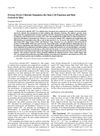 89 citations,
October 1996 in “Dermatologic Clinics”
89 citations,
October 1996 in “Dermatologic Clinics” Alopecia areata is likely caused by a combination of genetic factors and immune system dysfunction, and may represent different diseases with various causes.
 80 citations,
April 2018 in “Trends in Molecular Medicine”
80 citations,
April 2018 in “Trends in Molecular Medicine” Lichen Planopilaris and Frontal Fibrosing Alopecia may help us understand hair follicle stem cell disorders and suggest new treatments.
 29 citations,
March 2001 in “Clinics in Dermatology”
29 citations,
March 2001 in “Clinics in Dermatology” Steven Kossard classified lymphocyte-related hair loss into four patterns, each linked to different types of baldness.
 23 citations,
March 2001 in “Clinics in dermatology”
23 citations,
March 2001 in “Clinics in dermatology” Alopecia areata involves immune response and gene changes affecting hair loss.
 15 citations,
January 1988 in “Drugs”
15 citations,
January 1988 in “Drugs” The document concludes that treatments for female hair loss and excessive hair growth are temporary and not well-studied.
 8 citations,
March 2021 in “Medicina-lithuania”
8 citations,
March 2021 in “Medicina-lithuania” PRP treatment may promote hair growth and improve hair density in women with AGA, but more research is needed.
 1 citations,
July 2012 in “Springer eBooks”
1 citations,
July 2012 in “Springer eBooks” The document concludes that more research is needed to better understand and treat scarring hair loss conditions.
 April 2024 in “Journal of dermatology research reviews & reports”
April 2024 in “Journal of dermatology research reviews & reports” Using a laser helmet with Minoxidil works better for male hair loss than Minoxidil alone, with no extra side effects.
 May 2017 in “InTech eBooks”
May 2017 in “InTech eBooks” Some hair loss disorders cause permanent loss due to scarring, and treatments like steroids don't always work well.
 153 citations,
March 2017 in “Endocrine”
153 citations,
March 2017 in “Endocrine” Male pattern baldness involves genetics, hormones, and needs better treatments.
 27 citations,
April 2017 in “British Journal of Dermatology”
27 citations,
April 2017 in “British Journal of Dermatology” Hair loss involves immune responses, inflammation, and disrupted signaling pathways.
 23 citations,
January 2021 in “Biomedicine & Pharmacotherapy”
23 citations,
January 2021 in “Biomedicine & Pharmacotherapy” DHT stops hair regrowth in mice, similar to human hair loss.
 18 citations,
November 2016 in “Journal of Oral and Maxillofacial Surgery”
18 citations,
November 2016 in “Journal of Oral and Maxillofacial Surgery” Platelet-Rich Plasma (PRP) treatment can potentially increase hair density and quality in people with hair loss, but more research is needed to confirm its effectiveness.
 13 citations,
January 2016 in “Journal of cosmetology & trichology”
13 citations,
January 2016 in “Journal of cosmetology & trichology” Alternative treatments show promise for hair growth beyond traditional methods.

Hair loss can cause significant social and emotional issues, especially for women and young men.
 19 citations,
January 2017 in “Stem Cells International”
19 citations,
January 2017 in “Stem Cells International” Adipose-derived stem cells show promise in treating skin conditions like vitiligo, alopecia, and nonhealing wounds.
 15 citations,
April 2003 in “Journal of dermatology”
15 citations,
April 2003 in “Journal of dermatology” Alopecia areata causes hair loss due to an immune attack on hair follicles, influenced by genetics and environment.
 118 citations,
April 1998 in “Dermatologic Clinics”
118 citations,
April 1998 in “Dermatologic Clinics” Finasteride and minoxidil are effective for hair regrowth, while treatments for alopecia areata have varying success and continuous treatment is necessary.
 June 2008 in “British Journal of Dermatology”
June 2008 in “British Journal of Dermatology” Herpes gestationis is linked to certain antigens, atopic eczema affects T cell populations and may be eased by breastfeeding, higher doses of anti-androgen treatment can improve androgenic alopecia, topical minoxidil increases hair thickness, long-term methotrexate therapy can cause liver fibrosis in psoriasis patients, and Lichen Sclerosus et Atrophicus patients aren't at higher risk for autoimmune disorders.
 October 2022 in “JAAD international”
October 2022 in “JAAD international” Most patients with autoimmune blistering diseases experienced some hair loss, which may be underreported and linked to disease severity.
 June 2023 in “Frontiers in Medicine”
June 2023 in “Frontiers in Medicine” Protein tyrosine kinases are key in male pattern baldness, affecting skin structure, hair growth, and immune responses.
106 citations,
January 2013 in “Clinical and Developmental Immunology” Alopecia areata is caused by immune system attacks on hair follicles, often triggered by viral infections.
 33 citations,
September 2019 in “Dermatologic Surgery”
33 citations,
September 2019 in “Dermatologic Surgery” Using a special stem cell formula on the scalp once a month for six months helped people with hair loss grow more hair.
 7 citations,
January 2009 in “Biological & pharmaceutical bulletin”
7 citations,
January 2009 in “Biological & pharmaceutical bulletin” Ferrous Ferric Chloride may improve skin cell function and increase hair growth in mice.
5 citations,
March 2023 in “Cancer” Oncologists should better understand the unique impact of hair loss on Black breast cancer patients to offer more compassionate care.
 4 citations,
November 2021 in “Biomedicines”
4 citations,
November 2021 in “Biomedicines” New digital tools are improving the diagnosis and understanding of irreversible hair loss conditions.
143 citations,
January 2007 in “The American Journal of Human Genetics” Certain genes on chromosomes 6, 10, 16, and 18 may increase the risk of alopecia areata.
 59 citations,
December 2016 in “Clinical, Cosmetic and Investigational Dermatology”
59 citations,
December 2016 in “Clinical, Cosmetic and Investigational Dermatology” Acne keloidalis nuchae is a tough-to-treat condition that greatly affects quality of life, especially in men of African descent.
 42 citations,
October 2012 in “Dermatologic Clinics”
42 citations,
October 2012 in “Dermatologic Clinics” Trichoscopy is a useful tool for diagnosing different hair and scalp diseases without surgery.
 15 citations,
June 2018 in “Food Reviews International”
15 citations,
June 2018 in “Food Reviews International” Pumpkin seed oil may improve prostate health, bladder control, and hair growth in men.



























